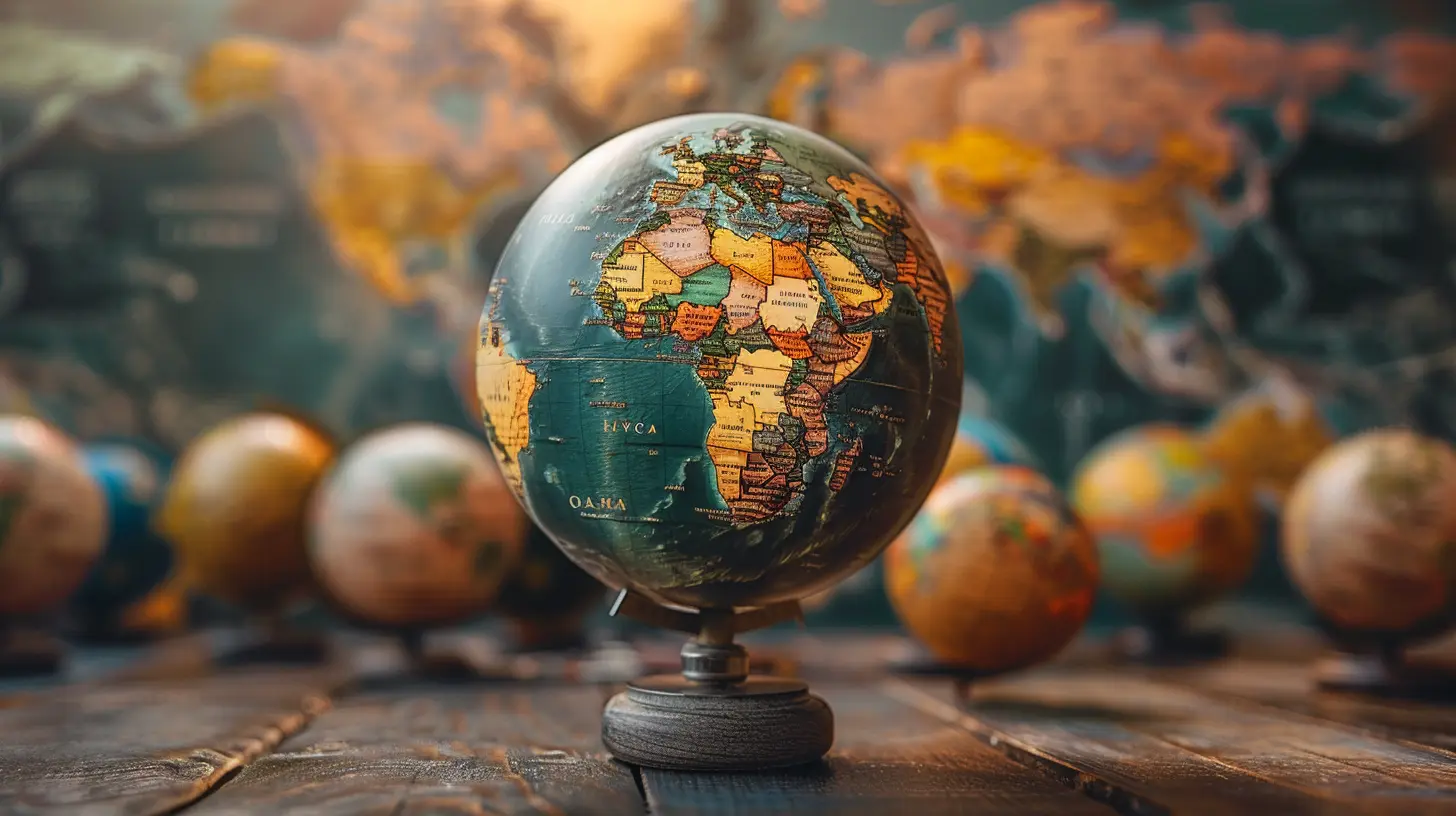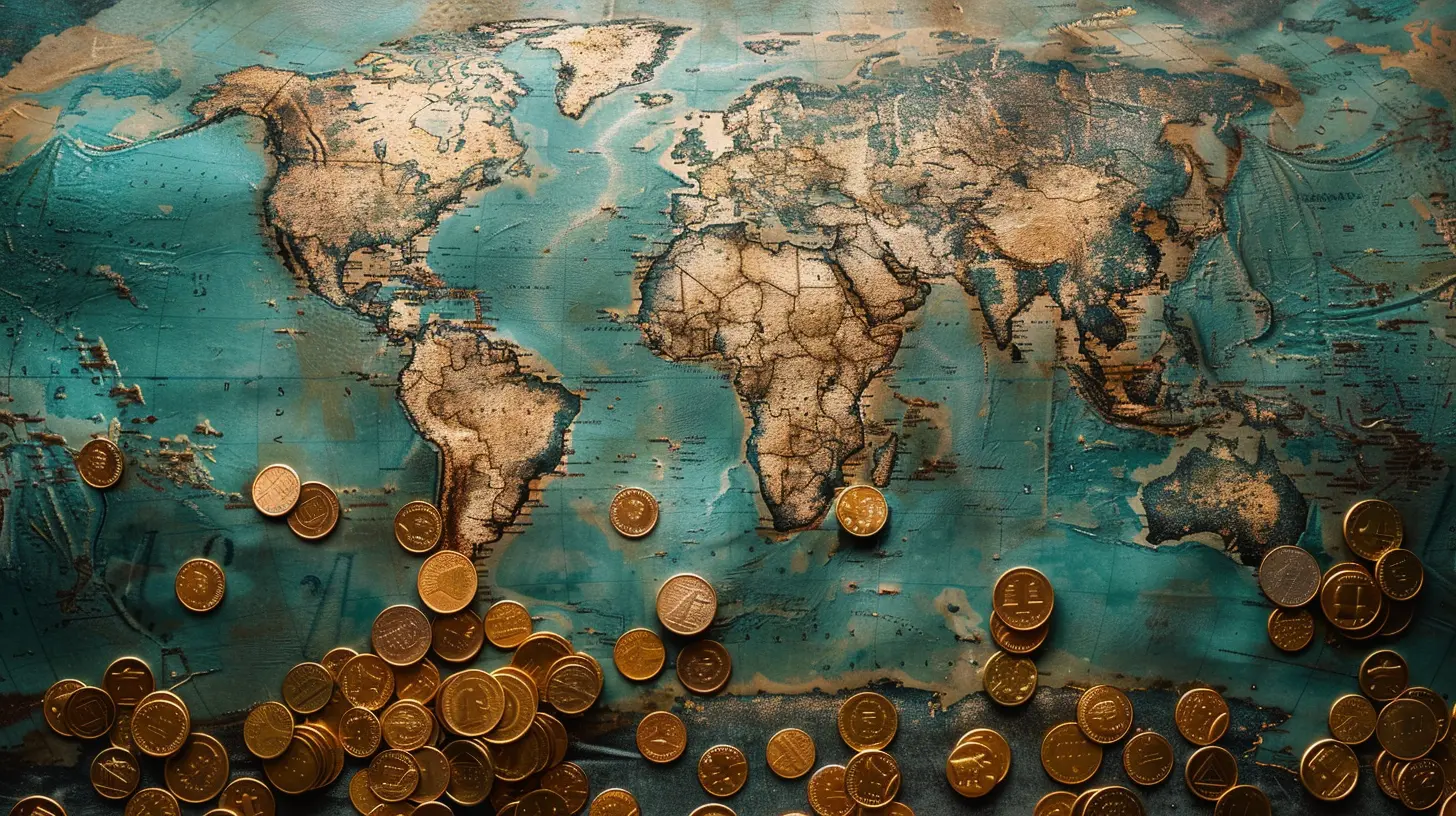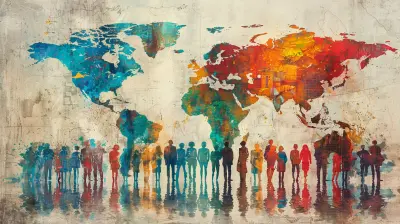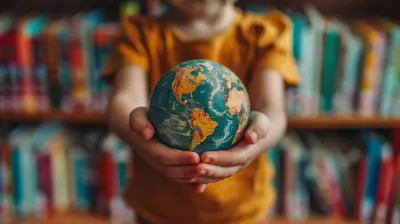The Interconnectedness of World Economies: A Social Studies Approach
31 December 2024
In today's world, it's hard to imagine a country standing completely on its own. Whether it's technology, trade, or tourism, nations are interconnected in ways that would have been unimaginable just a few centuries ago. But what does this actually mean for us? How do world economies influence each other, and why should we care? Well, buckle up because we're about to dive into the fascinating world of global economic interconnectedness, viewed through the lens of social studies.

What Does It Mean For Economies To Be Interconnected?
Alright, let’s break it down. When we say world economies are "interconnected," we're talking about how the economic activities of one country affect others. Picture the global economy as a giant spider web. If you tug on one strand—say, a financial crisis in one country—it ripples across the entire web, impacting countries around the world.Whether it's the price of coffee in your local café or the availability of the latest smartphone model, we’re all part of this global web. So, when something happens in another country, it’s not an isolated event. We all feel it, some more than others.
For example, when the housing market in the United States crashed in 2008, it didn't just hurt Americans. Banks and businesses from Europe to Asia felt the blow. That's the power of interconnected economies—what happens in one part of the world rarely stays there.

Historical Context: How Did We Get Here?
To understand how our economies became so intertwined, we need to take a quick look back at history. Economic interconnectedness didn’t just happen overnight. It was a gradual process that has been in the making for centuries.1. The Age of Exploration: The seeds of global trade were planted way back during the Age of Exploration in the 15th and 16th centuries. European nations began exploring new territories, setting up trade routes, and exchanging goods with far-flung parts of the world. Suddenly, people in Europe had access to spices from Asia and gold from the Americas. This was one of the first sparks of global economic connection.
2. The Industrial Revolution: Fast forward to the 18th and 19th centuries, and the Industrial Revolution further accelerated global economic ties. With innovations in transportation and manufacturing, countries could produce goods more efficiently and trade them on a larger scale. The invention of steamships and railroads made it easier to transport goods across continents, and nations began to rely more on each other for raw materials and markets to sell their products.
3. Globalization in the 20th Century: By the 20th century, the world saw an even greater level of economic interdependence. The creation of international organizations like the United Nations and World Trade Organization, as well as agreements like the Bretton Woods system, helped lay down the rules for global trade and finance. Globalization took off, and with it, the interconnectedness of economies became more pronounced than ever.

Key Drivers of Economic Interconnectedness
So, what are the factors driving this interconnectedness? Let’s break it down into some of the key elements.1. International Trade
Trade is probably the most obvious reason why economies are so connected. Countries trade goods and services with one another to meet their needs and wants. One country might specialize in producing cars, while another focuses on exporting oil. Rather than every country trying to produce everything, they trade with each other to get what they need.Think of it like this: If your neighbor bakes the best bread in the neighborhood, and you make killer coffee, why not trade instead of each trying to do both? It's a win-win. That’s exactly how international trade works. Countries focus on what they’re good at (comparative advantage) and rely on others for the rest.
2. Foreign Direct Investment (FDI)
Another big piece of the puzzle is Foreign Direct Investment (FDI). This happens when a company or individual from one country invests in business operations in another country. For example, an American company might open a factory in China. This creates jobs in China while allowing the American company to benefit from lower production costs.FDI strengthens the bonds between economies because companies operating across borders depend on the economic health of both their home country and the country where they’ve invested. If one suffers, the other could too.
3. Technology and Communication
In a world where you can video call someone in another country, buy something from a business halfway across the globe, and transfer money internationally with the click of a button, it’s clear that technology plays a huge role in connecting economies.With advancements in communication and transportation technologies, it’s easier than ever for businesses to operate globally. The internet has also made it possible for consumers to access products and services from around the world.
4. Global Supply Chains
When you buy a smartphone, it’s likely that its components were made in multiple countries. The screen might come from South Korea, the processor from the U.S., and it all gets assembled in China. This is what we call a global supply chain.Global supply chains are a significant reason behind the interconnectedness of economies. Companies rely on suppliers from around the world to keep their businesses running, and disruptions in one part of the chain can impact the entire operation.
5. Migration and Labor Mobility
People are also a big part of this interconnected web. Migration and labor mobility mean that workers from one country can move to another for better job opportunities. For example, many professionals from developing countries move to more developed nations for higher-paying jobs.This flow of people not only supports the economies of the countries they move to by filling skill gaps but also helps their home countries through remittances (money sent back home).

The Upsides of Economic Interconnectedness
So now that we know how world economies are connected, let’s talk about the benefits. Spoiler alert: There are quite a few!1. Access to a Wider Range of Goods and Services
Thanks to trade, we have access to goods and services from all over the world. Whether it's fresh fruits from South America or electronics from Asia, global trade allows consumers to enjoy products that aren't locally available. This leads to greater variety and often lower prices.2. Economic Growth and Job Creation
Interconnected economies can lead to job creation and economic growth. When countries trade with each other, it opens up markets for businesses, allowing them to expand and hire more workers. Foreign Direct Investment also plays a role in this, as companies invest in other countries, creating jobs and boosting the local economy.3. Innovation and Technology Sharing
When countries are connected economically, they’re more likely to share knowledge and technology. This can lead to innovations that benefit everyone. For instance, technological advancements in renewable energy can be shared globally, helping nations tackle climate change together.4. Global Cooperation
Economic interconnectedness often encourages global cooperation. When countries rely on each other for trade and investment, they’re more likely to work together to maintain stability. This cooperation can extend beyond economics to include political and social issues as well.The Downsides of Economic Interconnectedness
Of course, it’s not all rainbows and butterflies. There are some challenges that come with this level of interconnectedness.1. Economic Vulnerability
Remember that spider web we talked about earlier? Well, one of the downsides is that if one part of the web breaks, it can bring the rest down with it. Economic crises in one country can quickly spread to others. The 2008 financial crisis is a prime example of this, where a housing market crash in the U.S. had global ramifications.2. Inequality
While interconnectedness can lead to economic growth, it doesn’t always benefit everyone equally. In many cases, wealthier nations or corporations benefit the most, while poorer countries or workers may be left behind. This can lead to greater economic inequality both within and between countries.3. Environmental Impact
Global trade and production can have a significant impact on the environment. The transportation of goods across long distances contributes to carbon emissions, and the demand for cheap labor and resources can lead to environmental degradation in developing countries.4. Job Outsourcing
When companies move their operations to countries where labor is cheaper, it can lead to job losses in their home country. This is particularly a concern in industries like manufacturing, where outsourcing has led to the loss of many jobs in developed countries.
The Future of Economic Interconnectedness
Looking ahead, the interconnectedness of world economies is likely to continue, though it may evolve in new ways. With advancements in technology, such as artificial intelligence and automation, the global economy could change dramatically in the coming decades.There’s also growing awareness of the need for more sustainable economic practices. Many countries and businesses are beginning to focus on reducing their environmental impact and addressing economic inequality. The challenge will be finding ways to maintain the benefits of interconnectedness while minimizing its downsides.
Conclusion: Why It Matters
At the end of the day, the interconnectedness of world economies affects all of us, whether we realize it or not. From the products we buy to the jobs we work, we’re all part of this global web. Understanding how economies are connected can help us navigate the challenges and opportunities that come with living in an increasingly globalized world.So next time you sip your coffee or check your phone, remember—the world’s economies are working together in ways that make it all possible.
all images in this post were generated using AI tools
Category:
Social StudiesAuthor:

Eva Barker
Discussion
rate this article
19 comments
Finley Patterson
This article beautifully highlights the vital links between global economies. Understanding these connections fosters empathy and awareness, empowering us to navigate challenges collaboratively. Let’s embrace this interdependence and work together for a brighter, more equitable future!
March 31, 2025 at 4:26 AM

Eva Barker
Thank you for your thoughtful comment! I'm glad you found the article emphasizes the importance of interdependence in fostering empathy and collaboration for a better future.
Kade McMaster
Discover the hidden threads binding global economies—unravel the mysteries of trade, culture, and power in an ever-changing world.
March 10, 2025 at 4:41 AM

Eva Barker
Thank you! I appreciate your insights on the intricate ties between economies, culture, and power, which are essential in understanding our global landscape.
Soren Foster
Who knew learning about world economies could be as fun as a global potluck? Just remember: everyone brings something to the table, but some folks might still forget the dessert! 🍰🌍
February 14, 2025 at 7:41 PM

Eva Barker
Absolutely! Just like a potluck, each economy contributes unique flavors, but it's essential to ensure a balanced spread—desserts included! 🍰🌍
Daniel McCune
Understanding global economies enhances critical thinking and global awareness in students.
February 2, 2025 at 9:52 PM

Eva Barker
Thank you! I agree that exploring global economies fosters critical thinking and awareness, essential skills for navigating our interconnected world.
Wendy McClure
Unearth the hidden threads binding global economies—where trade routes whisper secrets of power and fate. Dive into a social studies expedition that reveals the unseen connections shaping our world. What will you discover?
January 31, 2025 at 12:26 PM

Eva Barker
In exploring the interconnectedness of world economies, you'll uncover how trade routes and economic relationships influence power dynamics and societal developments, revealing the complex web that shapes our global landscape.
Mateo McDonough
Understanding global interconnectivity enriches social studies, fostering critical thinking about economic impacts.
January 27, 2025 at 12:45 PM

Eva Barker
Thank you! I agree that recognizing global interconnectivity is essential for enhancing social studies, as it encourages deeper analysis of economic relationships and their implications.
Vance Mathews
This article offers valuable insights into the complex web of global economic relationships. By applying a social studies perspective, it highlights the importance of understanding how local actions can have far-reaching effects, fostering a more comprehensive approach to addressing economic challenges in our interconnected world.
January 23, 2025 at 7:29 PM

Eva Barker
Thank you for your insightful comment! I'm glad you found the article valuable in highlighting the complexities of global economic relationships and the significance of local actions.
Melissa McKnight
This article effectively highlights the intricate relationships between global economies, emphasizing the importance of a social studies perspective. By linking economic theories to real-world implications, it fosters a deeper understanding of our interconnected world and encourages critical thinking among students.
January 18, 2025 at 12:49 PM

Eva Barker
Thank you for your thoughtful comment! I'm glad the article resonated with you and highlighted the importance of understanding global economies through a social studies lens. Your insights on fostering critical thinking are much appreciated!
Laura Sanchez
This article brilliantly highlights how understanding the interconnectedness of world economies fosters critical thinking in students. By examining social studies from a global perspective, learners can better appreciate complex relationships and their implications for societal development and cooperation.
January 15, 2025 at 8:00 PM

Eva Barker
Thank you for your insightful comment! I'm glad you found the article emphasizes the importance of a global perspective in social studies. Understanding these connections is indeed crucial for fostering critical thinking and informed societal engagement.
Caden Rosales
This article compellingly illustrates how the complexities of global economies are intertwined, emphasizing the importance of a social studies perspective. Understanding these connections is crucial for fostering informed citizens who can navigate and contribute to an increasingly interdependent world. Insightful read!
January 11, 2025 at 5:09 AM

Eva Barker
Thank you for your thoughtful feedback! I’m glad you found the article insightful and appreciate your emphasis on the importance of understanding global interconnections.
Lacey McElhinney
In the tapestry of trade, we weave, Nations dance, share dreams, and believe. Through social studies, we unveil the ties, Economic currents where our futures rise. Together we thrive—interconnected, alive, In this global symphony, hope multiplies.
January 8, 2025 at 12:24 PM

Eva Barker
Thank you for your poetic reflection! It beautifully captures the essence of our article on the interconnectedness of world economies and the power of collaboration in shaping our futures.
Odessa Barlow
This article effectively highlights the crucial links between global economies, emphasizing the importance of social studies in understanding them.
January 5, 2025 at 6:02 AM

Eva Barker
Thank you! I'm glad you found the article insightful in showcasing the importance of social studies in understanding global economic connections.
Isaac Kirk
This article beautifully highlights the intricate ties that bind our global economies. Understanding these connections fosters empathy and awareness, encouraging us to engage thoughtfully in our increasingly interconnected world. Thank you for this insightful perspective!
January 4, 2025 at 8:41 PM

Eva Barker
Thank you for your kind words! I'm glad the article resonated with you and sparked important reflections on our global interconnectedness.
Samira McGonagle
Essential insights on global economic ties!
January 4, 2025 at 2:00 PM

Eva Barker
Thank you! I'm glad you found the insights valuable. Understanding global economic ties is crucial in today's interconnected world.
Betsy Richardson
Who knew world economies were like a giant game of Jenga? Pull one block, and the whole tower wobbles! Let's hope our social studies skills help us keep this intriguing tower standing tall—at least until recess!
January 3, 2025 at 9:50 PM

Eva Barker
Absolutely! Just like Jenga, understanding the connections in world economies is crucial for maintaining stability. Let's keep learning to support a strong foundation!
Juno Hensley
This article beautifully highlights the intricate web of global economies! I'm intrigued by how social studies can deepen our understanding of these connections. Exploring cultural exchanges alongside economic ties could reveal even more about our collective impact on the world.
January 2, 2025 at 9:26 PM

Eva Barker
Thank you for your insightful comment! I completely agree that exploring cultural exchanges alongside economic ties can enrich our understanding of global interconnectedness.
Shiloh Vance
Insightful perspective on global economies and their interdependence.
January 1, 2025 at 8:30 PM

Eva Barker
Thank you for your kind words! I'm glad you found the insights on global interdependence valuable.
Zeke Newton
Understanding global interdependence fosters critical thinking in social studies education.
December 31, 2024 at 12:42 PM

Eva Barker
Absolutely! Recognizing global interdependence is essential for developing critical thinking skills, as it encourages students to analyze complex relationships and understand diverse perspectives in social studies.
Wynter West
This article effectively highlights the importance of understanding global economic ties, fostering critical thinking in social studies education.
December 31, 2024 at 4:36 AM

Eva Barker
Thank you! I'm glad you found the article insightful in emphasizing the importance of global economic ties in social studies education.
MORE POSTS

Encouraging Active Participation Through Classroom Management

"How to Incorporate Emotional Intelligence Into Your Curriculum

Global Education Partnerships: Building Bridges Across Borders

Managing Classroom Chaos: Tips for High-Energy Classrooms

"How to Help Students Develop Self-Awareness and Empathy

Strategies for Supporting Students with ADHD

How Extracurriculars Foster Leadership and Teamwork Skills

Enhancing Student Engagement Through Structured Freedom

How to Choose the Right Extracurricular Activity for You

"How Emotional Intelligence Shapes Academic Perseverance

The Role of Teacher Feedback in a Flipped Classroom

Teaching Global Awareness and Cultural Studies in Homeschool